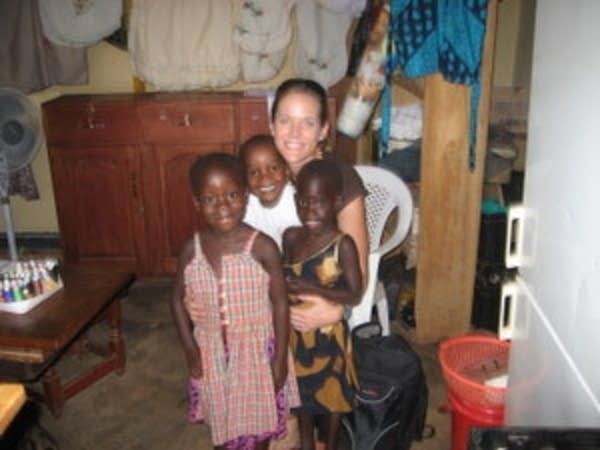Where tiny loans make a big difference

Taylor and Tamara Moore were in some ways a typical Minneapolis couple. Tamara was a middle school English teacher and Taylor worked in finance.
"My daily routine in Minneapolis was to get up, go to work at 7:30, and to sit in a series of meetings all day," says Taylor Moore.

"We both had this passion for traveling and working, and we thought, 'Wouldn't it be great if we could take a year of our life to go and work abroad, and submerge ourselves into a different culture?'" says Tamara.
And so they did. They moved to Uganda.
Create a More Connected Minnesota
MPR News is your trusted resource for the news you need. With your support, MPR News brings accessible, courageous journalism and authentic conversation to everyone - free of paywalls and barriers. Your gift makes a difference.
"It's challenging because you come home and you eat dinner and you think, literally down the road from you, people are getting by on one meal a day," says Tamara Moore. "I've never seen poverty this close up and this vast. I don't think either of us have."
In Uganda, Tamara and Taylor Moore are fellows with an organization called Kiva.org. Kiva paired the couple based on their skills with a nonprofit in Uganda, Life in Africa. Taylor helps develop a financial plan for the nonprofit, and Tamara interviews people receiving loans.
Kiva has received a lot of attention for the innovative way it allows people around the world to make loans. Everyday people can act as banks, and make a loan of as little as $25 over the Internet.

If you log onto the Kiva Web site, you see exactly who is doing the lending and who is trying to start a business. You get updates as well, to see if the business is thriving or failing.
Former President Bill Clinton is a fan. He writes about Kiva in his new book, "Giving: How Each of us can Change the World." He's also spoken about the organization in several interviews.
"It makes you feel like you know these people, you see their picture, you know the facts of their business, you know what their lives are like," Clinton said in an interview on Fox News in September.
Matt Flannery is co-founder of Kiva. He says the personal element that Clinton mentions is probably what makes Kiva so popular. He believes that rather than just donating money to a person, partnering up with them is more rewarding. Many people who make loans through Kiva eventually get their money back.
Flannery is a computer programmer who lives in San Francisco. After he got married, he says his wife Jessica "dragged" him with her to volunteer in microfinance in East Africa. He saw the poverty and suffering he was expecting.
"It might not be a huge change, but it's a change. Instead of one meal [a day], you have two."
"But also what is very true is people are very entrepreneurial and have big dreams, so that's one thing we wanted to reflect in our organization, which is to get these dreams across," says Flannery.
Once they returned to the U.S., the couple brainstormed ways to encourage individuals to get involved. They wanted to maintain a personal connection to the lending. They came up with Kiva. Flannery admits it was a slow start.
"Kiva, for a year and a half, was my little project with my wife. And no one came to the Web site. It was just my personal homepage. We had no organization, no bank account," recalls Flannery.
But all that's changed. Almost 160,000 people have loaned almost $16 million through Kiva. The average loan is $100.
Back in Uganda, Tamara Moore interviews people receiving loans and updates the Kiva Web site on how they're doing.
"Most of them are women. A lot of them are the breadwinners, and they're selling charcoal because obviously there's no electricity here, so people use charcoal, " says Tamara Moore. "There's also a rock quarry, a lot of them actually break stone all day and sell stone (for) construction."
Moore sees how small loans can enable parents to afford fees for school, so their children can be educated. Whatever the business, she says, she sees firsthand the real changes that the loans bring.
"It might not be a huge change, but it's a change. Instead of one meal, you have two," says Tamara Moore.
The couple expects to remain in Uganda through September 2008.
